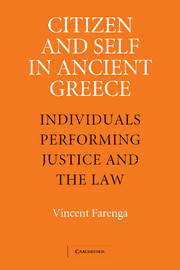Book contents
- Frontmatter
- Contents
- Acknowledgments
- Introduction
- 1 Justice to the Dead: Prototypes of the Citizen and Self in Early Greece
- 2 Performing Justice in Early Greece: Dispute Settlement in the Iliad
- 3 Self-Transformation and the Therapy of Justice in the Odyssey
- 4 Performing the Law: The Lawgiver, Statute Law, and the Jury Trial
- 5 Citizenship by Degrees: Ephebes and Demagogues in Democratic Athens, 465–460
- 6 The Naturalization of Citizen and Self in Democratic Athens, 450–411
- 7 Democracy's Narcissistic Citizens: Alcibiades and Socrates
- Conclusion
- References
- Index
7 - Democracy's Narcissistic Citizens: Alcibiades and Socrates
Published online by Cambridge University Press: 23 July 2009
- Frontmatter
- Contents
- Acknowledgments
- Introduction
- 1 Justice to the Dead: Prototypes of the Citizen and Self in Early Greece
- 2 Performing Justice in Early Greece: Dispute Settlement in the Iliad
- 3 Self-Transformation and the Therapy of Justice in the Odyssey
- 4 Performing the Law: The Lawgiver, Statute Law, and the Jury Trial
- 5 Citizenship by Degrees: Ephebes and Demagogues in Democratic Athens, 465–460
- 6 The Naturalization of Citizen and Self in Democratic Athens, 450–411
- 7 Democracy's Narcissistic Citizens: Alcibiades and Socrates
- Conclusion
- References
- Index
Summary
JUDGING ALCIBIADES
Antiphon's contribution to Athenian intellectual life legitimized the frame of physis as a temporary shelter or retreat where each citizen could perform a certain kind of moral deliberation with himself and rationally calculate his self-interest. Once an individual completed this deliberation and calculation, however, Antiphon advised him to seek recognition by returning to the contest in question, abiding by its rules, and risking a rise or fall in self-interest at the hands of opponents or fortune. But from the 420s onward, other Athenian minds responded differently to the lure of calculations forged within the crucible of physis – and to the intellectual and moral legitimacy with which Antiphon endowed these calculations. Because it maximized the freedoms nomos conferred on Athenians, this paradigm of citizenship and selfhood almost invited them to exploit its breakthrough and devise other strategies for a citizen's life – especially strategies reflecting a more radical attachment to self-interest. What sort of strategy would emerge, for example, if a citizen disregarded the need to return wholeheartedly to the frame of nomos and risk the moves prompted by physis and self-interest? What if, in returning to citizen life within the frame of nomos, he held the autonomy conferred by physis as a nonnegotiable value? What if he could play the polis game by sometimes confusing opponents about the rules of the game, or persuading them that his novel – and illegal – moves were permissable, even desirable, for communal well-being?
- Type
- Chapter
- Information
- Citizen and Self in Ancient GreeceIndividuals Performing Justice and the Law, pp. 471 - 535Publisher: Cambridge University PressPrint publication year: 2006



